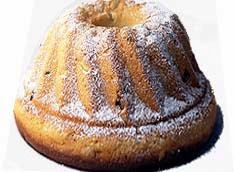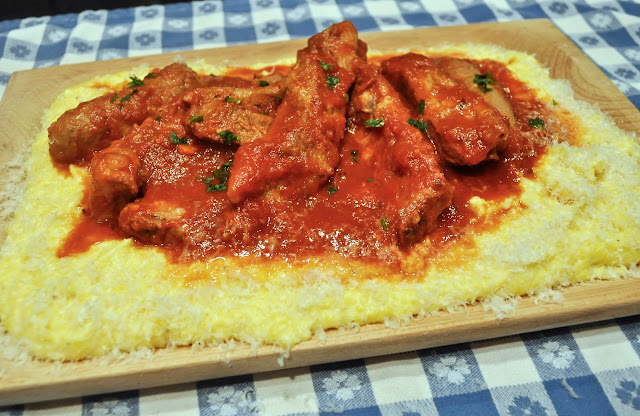Kugelhopf or Gugelhupf call it what you will.
Two ways of spelling one cake. Well it all depends on where you live in the world. So you can go with whichever name you choose. When it's spoken I believe that the pronunciation is almost the same.

This piece of deliciousness is a rich yeast leven bread although you could be forgiven for thinking it a cake. I first saw them in the Alsace in France and I just knew that I had to make one or eventually two or three. The first hurdle was getting the right pan. They are traditionally baked in a terracotta mould that is glazed on the inside so that the bread does not stick. However, you know me, I prefer to use silicone and this year when I was in a market in Borgo Val di Taro, I saw just what I was after and snapped it up straight away.
This recipe that was given to me by a friend fits the shape perfectly and it has the benefit of being really, really easy. What more could you ask for?
So let's get cooking
20g fresh yeast or 1 pack of dried
500g Plain Flour
8 tablespoons Vegetable Oil
80g Sugar
125ml milk
125g Dried apricots. I used the semi dry variety.
50g Sultanas
3 Eggs
grated rind of half a lemon
a pinch of salt
50g Flaked or whole almonds
dusting sugar to finish

This piece of deliciousness is a rich yeast leven bread although you could be forgiven for thinking it a cake. I first saw them in the Alsace in France and I just knew that I had to make one or eventually two or three. The first hurdle was getting the right pan. They are traditionally baked in a terracotta mould that is glazed on the inside so that the bread does not stick. However, you know me, I prefer to use silicone and this year when I was in a market in Borgo Val di Taro, I saw just what I was after and snapped it up straight away.
This recipe that was given to me by a friend fits the shape perfectly and it has the benefit of being really, really easy. What more could you ask for?
So let's get cooking
20g fresh yeast or 1 pack of dried
500g Plain Flour
8 tablespoons Vegetable Oil
80g Sugar
125ml milk
125g Dried apricots. I used the semi dry variety.
50g Sultanas
3 Eggs
grated rind of half a lemon
a pinch of salt
50g Flaked or whole almonds
dusting sugar to finish
- Warm the milk to body heat and crumble in the yeast with a spoonful of sugar. Cover and leave somewhere warm to rise for about 10mins. If I am sure that the yeast is active I frequently miss out this step and carry straight on as soon as the yeast has dissolved.
- Beat the eggs with the sugar to break them up and mix into the yeast mixture. You are not aiming for a foam here, just mix enough to disperse the egg mixture.
- In a large bowl put the flour, lemon rind, remaining sugar, oil and salt. Pour over the milk mixture and mix really well to incorporate everything. This is not really kneading as the mixture is too soft, but you will need to beat it until it is smooth.
- Cover the mix and leave it to rise somewhere warm for about 45mins to 1 hour. It should at least double in size.
- Cut the apricots into smallish cubes, about 1 cm is good. Pour some boiling water over the sultanas and leave to cool. Strain. The sultanas should have plumped up by now.
- Add to them both to the yeast mix along with 30 g of the almonds.
- Butter the gugelhupf mould well. Yes even if it is a silicone one. sprinkle with the remaining flaked almonds. Distribute the mixture into the mould. Cover and leave to rise for at least 30 mins.
- About 10 minutes before the gugelhupf is to go into the oven turn it on to 200 degrees C. Cook for about 45 mins. Cover with greaseproof paper if it is getting too brown.
- Remove from the oven and allow to cool for about 5 mins. Then turn out onto a cooling rack and dust with icing sugar. If you can get it high humidity sugar is best as it remains white. Icing sugar often disappears into the cake.


Comments
Post a Comment